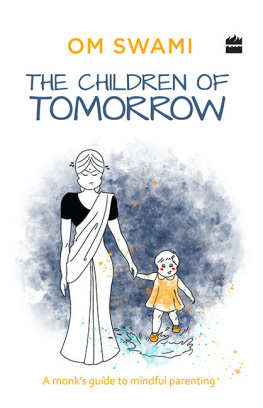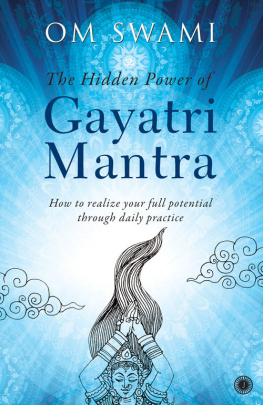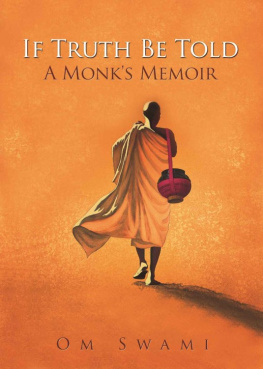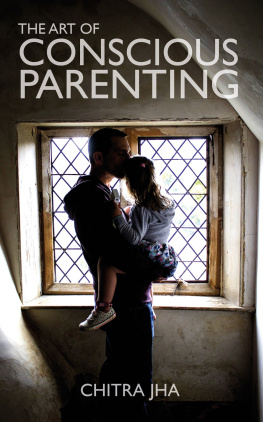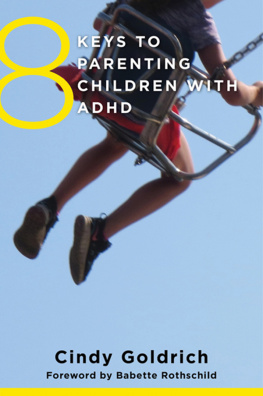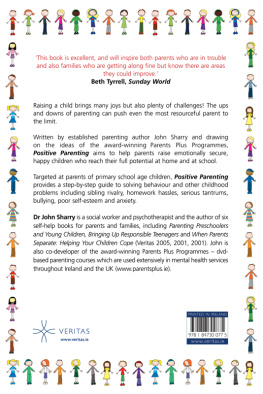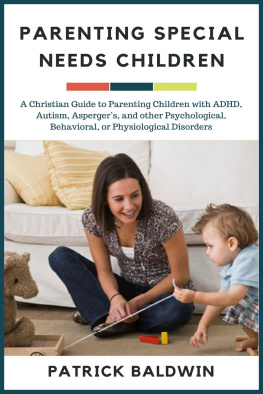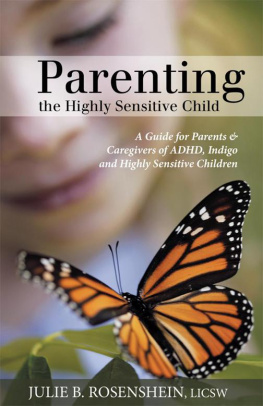THE CHILDREN
OF
TOMORROW
A MONKS GUIDE TO MINDFUL PARENTING
OM SWAMI

CONTENTS



I n a quaint country town lived a pastor well known for his insights on parenting. People travelled far and wide to seek his counsel. It was said that this young pastor had condensed all the great learnings of parenting into ten simple instructions which he called The Ten Commandments of Parenting. He proudly displayed them right at the churchs entrance. Parents, be it aspiring, experienced or new, devoured his instructions and lived by them. When the pastor turned thirty-five, he married a demure young woman from his congregation.
Two years later, they had their first child; a chubby cheeked daughter they lovingly named Mary. That the pastor would turn out to be a great father (no pun intended) was a given. After all, he was the original author of the ten commandments of parenting. Soon, the pastor discovered that sometimes he had to make certain exceptions to his own commandments for his little daughter although a bundle of joy, she was also a little tyke who drove him up the wall at the drop of a hat. One night, as he sat exhausted by his daughters bedside, he had a sudden realization. The next morning, he ran to the church and renamed the title of the ten commandments. Up went the new header that now read:
Ten Laws of Parenting
Three years after the birth of his daughter, the pastors wife gave birth to a healthy son whom they named George. Now the pastor was juggling his job, family, social and religious duties. A bald patch had already begun to peek out from under the shiny, blond hair he once had. After being a parent for just four years, he had another epiphany and decided to change the title of his commandments again. This time, the sign Ten Laws of Parenting was replaced with:
Ten Rules of Parenting
Some more time passed and they had one more child, another daughter, Lara. Seven years, three children and several parent-teacher association (PTA) meets later, the pastor figured that he had, in fact, been a fool! There were no rules when it came to parenting. Once again, he printed a new header to replace the old one and pasted it outside the church. But this time he placed it discreetly, near the community board.
Ten Guidelines of Parenting
A mere one year later, his wife was pregnant again and gave birth to their second son, Gregory. With a screaming and kicking Mary, George, Lara and now Gregory in tow, the pastor set out to attend Sunday Church. Before addressing his congregation that morning, the pastor handed a new title to the administration clerk and asked that it be pasted on the back door of his church.
Ten Tentative Ideas on Parenting, it read.
So is this book. In a way.
There are no hard or fast rules when it comes to parenting; no clear dos and donts, no absolute rights or wrongs. Everything is relative, subjective and circumstantial. Any evidence of great parenting is mostly anecdotal at best.
Every year, I meet a few thousand people in small groups. Out of these, at least two thousand or so I meet one-on-one including a few hundred children, from ages five to grown-ups well into their mid- to late twenties.
I dont know what to do with my mother, said a young boy to me, and she doesnt know what to do with me. I dont know what the solution is.
We have no communication in the family, a lady said to me once. If I enter my childrens room, they instantly ask, What do you want?
My parents just dont understand me, said a fourteen-year-old girl to me the other day. The whole world thinks they are very nice people, whereas in reality they are very nasty. They argue and fight all the time. I hate going back home after school.
My son says, Your position means nothing, a very prominent politician said to me once. If you look at how big the world is, no one knows you outside your constituency.
And what does your son do? I asked this person.
Hes thirty years old and does nothing, came the dejected reply. He plays video games most of the time and sleeps the rest.
This is a common scenario in most households. Parents are fed up of their children and children are disgusted with their parents. Many kids admit that they really want to make their parents proud but are helpless in front of the distractions of TV, social media and peer pressure. Others say that no matter what they do, their parents just cant be made happy.
Parents too have similar stories about their children. That their children are very lucky compared to them because when they were growing up, their parents used to beat them senseless. Some say that they have always supported their children and yet the children dont seem to care. Many contend that their son or daughter is so intelligent, its just that he or she doesnt work hard. And so on.
Over the years, Ive had the chance to observe from close quarters as well as track the progress of certain children. It has led me to make certain important discoveries that, given the right guidance at the right time, any child can be made to realize their true potential. While there are no commandments or laws of parenting, the truth is that there are certain spiritual insights I can share with you based on my own knowledge gleaned from experience and various psychological studies. Hopefully, they can help you steer your child in the right direction.
Since the time I can remember, Ive lived a life of discipline, believing in the power of knowledge and hard work. Today, the sole purpose of my life is to give my two cents worth to raise the happiness quotient of our beautiful world by nurturing more happy individuals. Now, as I inch towards the twilight at dusk, I realize more than ever that the future of our world rests on the twilight at dawn: our children. On their tender shoulders rests a great nation, a baffling world and a beautiful planet. It is, therefore, my dharma to share what little I know so that a parents hand is raised to protect a child and not abuse them. Lets strive to create an environment where the billion possibilities in their impressionable brains are given the opportunity to be realized. For a moment, envision them walking in a world (created by us adults) with their heads held high, with hope in their hearts, and a spark in their eyes.
Walk with me.
Dad: Youll never amount to anything because you procrastinate.
Son: Oh, yeah? Just you wait!

I n 1973, four-year-old Susan opened the cupboard of the guest room in her house and saw many chess pieces fall out of a small bag. Just next to them was a rolled-up chess mat. She took the mat out and looked at the pieces with the kind of intrigue comparable to any other child of her age.
What are these, Mummy? Susan asked innocently, holding a piece in her hand and examining it.
These are chess pieces, Zsuzsa, she said, careful to not sound too enthusiastic, worried it might kill Susans excitement. When parents are too excited to introduce something to a child, the child almost always rejects it. I dont think children do it consciously its more a reflex action in the beginning. They hear parents saying no all the time and that no becomes their standard response too. And once children discover the joys of rebellion, they stick with their original no for a long time. Klara Polgar, however, was better prepared.
Next page
